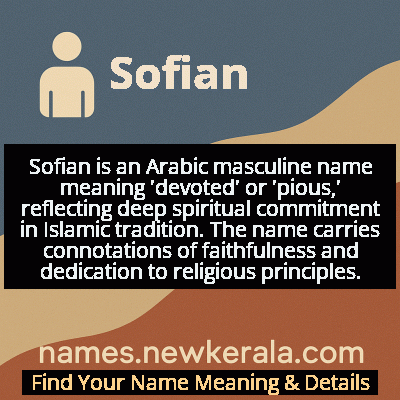Sofian Name Meaning & Details
Origin, Popularity, Numerology Analysis & Name Meaning of Sofian
Discover the origin, meaning, and cultural significance of the name SOFIAN. Delve into its historical roots and explore the lasting impact it has had on communities and traditions.
Name
Sofian
Gender
Male
Origin
Muslim
Lucky Number
1
Meaning of the Name - Sofian
Sofian is an Arabic masculine name meaning 'devoted' or 'pious,' reflecting deep spiritual commitment in Islamic tradition. The name carries connotations of faithfulness and dedication to religious principles.
Sofian - Complete Numerology Analysis
Your Numerology Number
Based on Pythagorean Numerology System
Ruling Planet
Sun
Positive Nature
Leaders, ambitious, highly driven, self-reliant, innovative.
Negative Traits
Overly aggressive, domineering, impatient, selfish.
Lucky Colours
Red, orange, gold.
Lucky Days
Sunday.
Lucky Stones
Ruby, garnet.
Harmony Numbers
2, 3, 9.
Best Suited Professions
Entrepreneurs, managers, engineers.
What People Like About You
Courage, determination, leadership.
Famous People Named Sofian
Sofian Chahed
Footballer
German-Tunisian professional footballer who played for clubs including Hertha BSC and represented Tunisia internationally
Sofian Akouili
Footballer
Moroccan professional footballer who played as a defender for clubs in Morocco and the Netherlands
Sofian Hmam
Handball Player
Tunisian handball player who represented Tunisia in international competitions including the World Men's Handball Championship
Sofian Kiyine
Footballer
Moroccan-Belgian professional footballer who has played for clubs in Belgium, Italy, and Morocco's national team
Name Variations & International Equivalents
Click on blue names to explore their detailed meanings. Gray names with will be available soon.
Cultural & Historical Significance
In many Muslim communities, the name Sofian is chosen to honor this historical narrative and to express hope that the bearer will embody similar qualities of eventual devotion and strong faith. The name carries connotations of spiritual growth, resilience, and the capacity for profound personal transformation through faith. Throughout Islamic history, the name has been associated with individuals known for their deep commitment to religious principles and community service, making it a name that conveys both historical weight and aspirational qualities for modern Muslim families.
Extended Personality Analysis
Individuals named Sofian are typically perceived as deeply devoted and spiritually inclined, often demonstrating strong commitment to their beliefs and principles. They tend to be introspective and thoughtful, with a natural inclination toward philosophical or spiritual matters. Sofians are known for their loyalty and steadfastness in relationships, whether personal or professional, and they often serve as pillars of support for those around them.
Their devotion extends beyond religious contexts to include dedication to family, community, and personal goals. While they can be serious and contemplative, they also possess a quiet strength that others find reassuring. Sofians are often seen as reliable individuals who approach life with purpose and meaning, valuing depth over superficiality in their interactions and pursuits. They typically exhibit patience and perseverance, especially when facing challenges, drawing strength from their inner convictions and spiritual resources. This combination of devotion, reliability, and inner strength makes Sofians respected members of their communities who often take on leadership roles where trust and consistency are valued.
Modern Usage & Popularity
In contemporary times, Sofian remains a popular name in Muslim communities worldwide, particularly in North Africa, the Middle East, and Southeast Asia. The name has maintained consistent usage without becoming overly trendy, striking a balance between traditional significance and modern appeal. In recent years, variations like Sofiane have gained popularity in French-speaking Muslim communities, while the classic Arabic form Sufyan continues to be widely used. The name is particularly favored by parents seeking a name with strong Islamic heritage that also sounds modern and international. Its usage spans across various socioeconomic backgrounds and continues to be a meaningful choice for families wanting to honor Islamic tradition while giving their child a name that works well in global contexts. The name's moderate popularity ensures it remains distinctive without being unfamiliar in most Muslim societies.
Symbolic & Spiritual Meanings
Symbolically, Sofian represents the journey of faith and spiritual devotion. It embodies the transformation from doubt to certainty, from opposition to acceptance, mirroring the historical narrative of Abu Sufyan's conversion to Islam. The name carries metaphors of light emerging from darkness, guidance following confusion, and commitment replacing uncertainty. In a broader sense, Sofian symbolizes the human capacity for change and growth, particularly in matters of belief and principle. It represents the idea that true devotion often follows a period of questioning or resistance, making the eventual commitment more profound and meaningful. The name also carries connotations of steadfastness and reliability, suggesting someone who provides spiritual or emotional anchor points for others in times of uncertainty. This symbolic richness makes Sofian a name that speaks to both personal spiritual development and communal responsibility.

